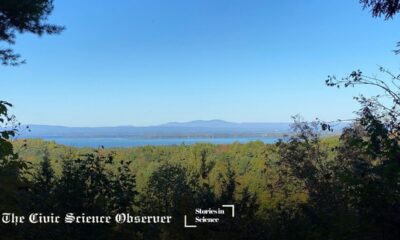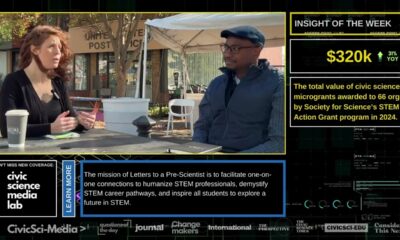Stories in Science Special Series
The Courage to Say No

by William Yakah | Undergraduate Student (Neuroscience) | Michigan State University |
[dropcap]L[/dropcap]ike many others in middle school, I didn’t know exactly what I wanted to be in the future. In 6th grade, my class had a group of college students talk to us about pursuing higher education. Before they left, they gave us notebook covers that had a bold inscription: “Protect your Dream.” My dream, at this point, was not to end up like most of the kids in my neighborhood. My neighborhood was a slum in the heart of Accra with a lot of single parent families. Many kids did not make it past elementary school. Most parents were uneducated, and as such, many saw little need to motivate their children to go to school. Some kids did drugs, others got pregnant in their teen years and most sought after menial jobs. I was motivated to go further to learn what’s up the ladder of education that they were missing. To do so, I had to find ways to be different.
As much as I wanted to pursue higher education, I faced the harsh realities of my situation. I was attending a middle school few miles from my neighborhood where nearly 80% of graduates didn’t go to high school. I’m from a big family with four brothers and cousins. My parents had low-income jobs and could not make enough money to pay for my high school fees. “Nah bro, forget high school”, I’d ponder to myself. Even during middle school where tuition was free, I had to borrow textbooks from friends to study because I couldn’t afford them. This meant I had to study at least three weeks prior to finals because the textbook owners needed their books back to study for their own finals! Knowing I didn’t want to end up like the average kid in my neighborhood helped me streamline my friends and become selective in making new friends.
Three months prior to BECE, the national exams you take to gain admission into high school, I learned of an opportunity to gain a full scholarship to high school, ONLY if I got into a top ranked high school in Ghana. Again, the odds were against me. Previous exam results from my school showed no potential to bank my hopes on. I convinced myself to reject the statistics and be the unicorn. I projected my future final grades on paper and would look at it every day to remind myself why the statistics didn’t apply to me. There was even a teacher who would refer to previous statistics to show us why we weren’t going to pass. All it did was to make me even more determined to write my own version of results. The more negativity I heard, the more I was encouraged to say no.
Needless to say, I did get accepted into a top ranked high school and received the full scholarship from Ghana Educational Collaborative! In fact, I was the only student in my graduating class to get A’s in math and science! While I do not think I was any more special than my friends, I think we made different choices. Some gave up trying as we were routinely reminded of the odds against us. But I made the decision to plot my own path, and to constantly say no to the obstacles ahead of me.
My background cannot put my back on the ground and irrespective of where I come from, my biggest limitation will always be me.
At high school, I was determined to make the best of the opportunity because I only had one shot to keep my scholarship. So, I wanted to make it count. I enjoyed most of my core science classes, but I had a deep love for chemistry. One day, after our class on electrochemistry, I saw a nicely packed ash from burnt wood on the driveway as I walked to the bus station with friends. We had just learned about how to make batteries from electrolytes. I zoned out of our conversation and started thinking about possible uses of this waste ash. Later that night, we had a power outage that prevented me from studying for a test the next day. I couldn’t think of anything throughout the night but having an alternative source of electricity to study. The next day, I started reading about the composition of wood ash and whether it could possibly be used to build an electrochemical cell. The results were heartbreaking, as there was no literature on google about wood ash. Although disappointed, I wasn’t going to give up trying. The following Saturday, I went back to school with a friend to test our own hypothesis that ash from wood would produce a basic solution that can be used as an electrolyte to build our electrochemical cell. How were we going to find out? We naturally attempted to power a clock with our wood ash cell! Baby steps, right? At this point, I was about to find out if all the science I had been memorizing could actually be used. And guess what? It worked! We got 1.2V from each cell and with two, we powered our clock and later built a wood ash powered clock for our chemistry lab (See video below). We later built a multipurpose battery box that could charge a phone and power multiple lamps at the same time, all powered by wood ash!

William Yakah
My biggest accomplishment from the wood ash project wasn’t the fact that we won the national science and technology fair that year (2013). It was for the unique opportunity to have a feel of curiosity-driven research and the lessons that came with it. I learned not to stop asking questions, even when google doesn’t have the answer. I’ve found a deep love for asking the “why” questions in my classes which sometimes, is never-ending discussion that turn into research projects. These lessons have been very crucial in my college career as I explore many research interests and career paths. Statistics are great, but we should not let the numbers define how far can go or how much more we can achieve. I always reminded myself (and I still do) that my background cannot put my back on the ground and irrespective of where I come from, my biggest limitation will always be me.
Zig Ziglar summarizes my reasons for sharing this piece in one quote. He said “people often say that motivation doesn’t last. Well, neither does bathing – that’s why we recommend it daily.” I share this as a constant reminder to myself and to anyone who feels overwhelmed in their pursuit of science or any career goal to develop the courage to say no. Saying no to hindrances and embracing challenges on our journey in science could be a great way of breaking barriers and rewriting our version of the statistics.
Featured Image by Nandhu Kumar on Pixabay | CC0 Public Domain
Metrics
Sessions
Total number of Sessions. A session is the period time a user is actively engaged with the page.
Visitors
Users that have had at least one session within the selected date range. Includes both new and returning users.
Page views
Pageviews is the total number of time the article was viewed. Repeated views are counted.
The CS Media Lab is a Boston-anchored civic science news collective with local, national and global coverage on TV, digital print, and radio through CivicSciTV, CivicSciTimes, and CivicSciRadio. Programs include Questions of the Day, Changemakers, QuickTake, Consider This Next, Stories in Science, Sai Resident Collective and more.

-
 Audio Studio1 month ago
Audio Studio1 month ago“Reading it opened up a whole new world.” Kim Steele on building her company ‘Documentaries Don’t Work’
-
Civic Science Observer1 week ago
‘Science policy’ Google searches spiked in 2025. What does that mean?
-
Civic Science Observer1 month ago
Our developing civic science photojournalism experiment: Photos from 2025
-
Civic Science Observer1 month ago
Together again: Day 1 of the 2025 ASTC conference in black and white
Contact
Menu
Designed with WordPress
























